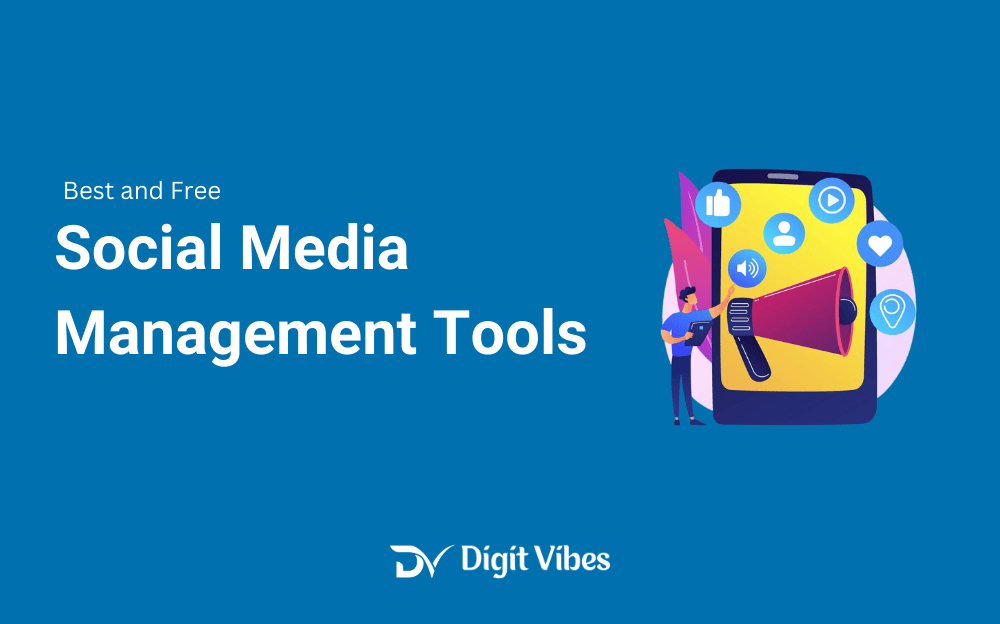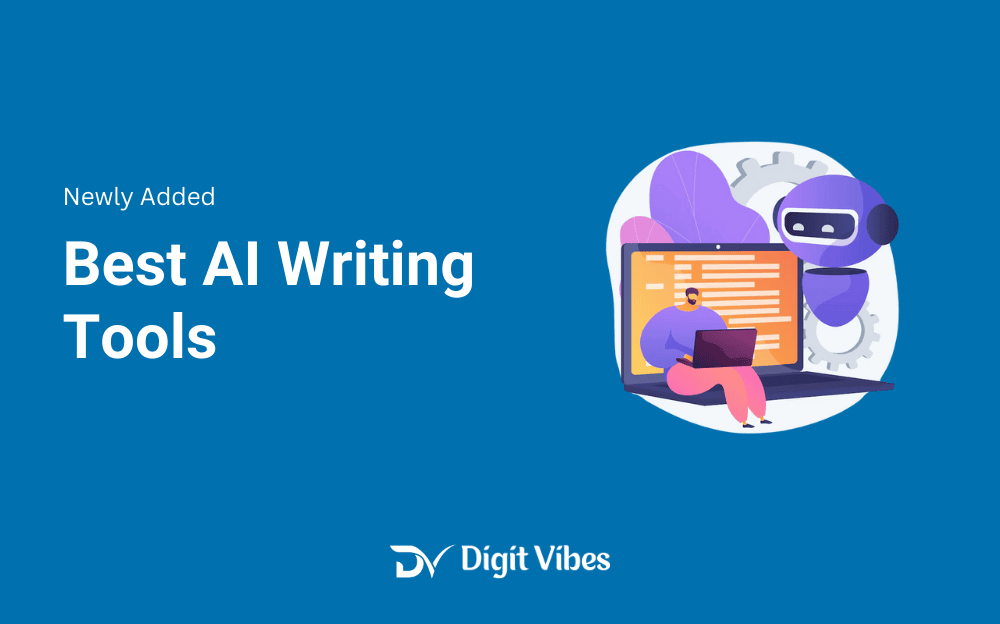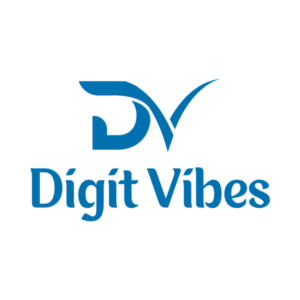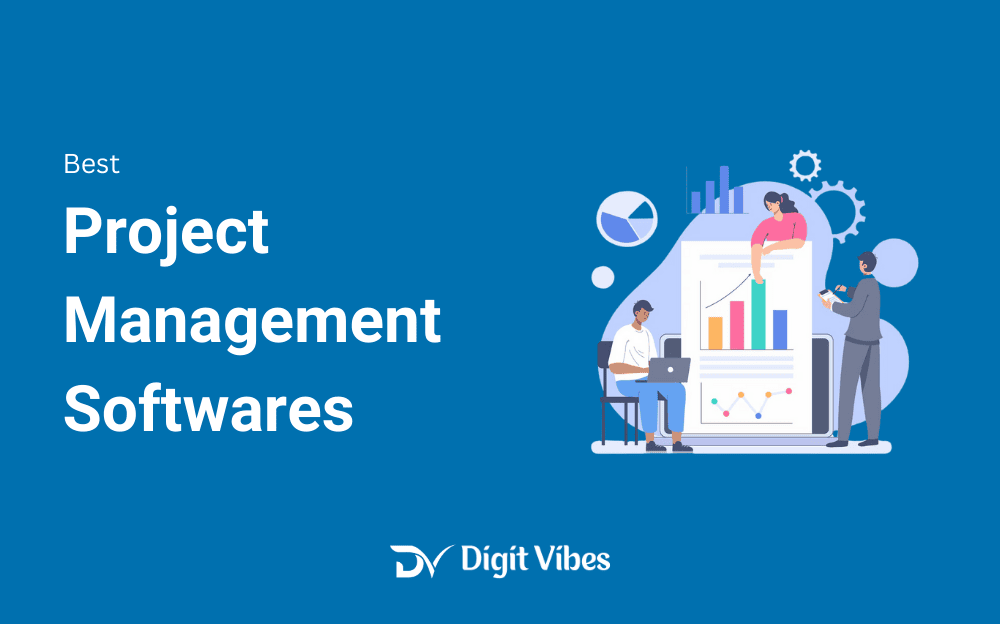
Choosing the right project management software can make all the difference. With so many options available, it can be challenging to find the tools that best fit your team’s needs.
I have personally used many project management software tools. Based on my experience, I’ve compiled a list of the top project management software, providing a detailed overview of each one’s features, benefits, and potential drawbacks.
This guide aims to help you select the best tool for your team’s specific needs and preferences. By understanding the strengths and limitations of each option, you can make a more informed decision and improve your project management practices.
By the end of this article, you’ll have a clear understanding of which software is best suited to help your team work more efficiently and achieve your project goals.
List of Top Management Software:
Top Project Management Software
This table gives a quick overview of each tool, highlighting its key features and the type of teams or projects it’s best suited for:
| S.No | Project Management Software | Key Features | Best For |
|---|---|---|---|
| 1 | Asana | Task management, timelines, workflows | Teams of all sizes |
| 2 | Trello | Boards, lists, cards, drag-and-drop | Simple, visual project management |
| 3 | Monday.com | Custom workflows, automation, multiple views | Customizable workflows |
| 4 | Jira | Agile boards, Scrum/Kanban, issue tracking | Software development teams |
| 5 | ClickUp | Task management, Gantt charts, time tracking | All-in-one productivity |
| 6 | Wrike | Customizable workflows, reporting, real-time collaboration | Advanced project management |
| 7 | Basecamp | Message boards, to-do lists, file storage | Small to medium-sized teams |
| 8 | Smartsheet | Task lists, Gantt charts, automation | Spreadsheet-like project management |
| 9 | Microsoft Project | Gantt charts, resource management, advanced reporting | Complex, enterprise projects |
| 10 | Notion | Customizable databases, kanban boards, document collaboration | Versatile project and note management |
Now, let’s dive into the details of each project management software:
1. Asana
Asana is a versatile project management tool designed to help teams track their work, manage tasks, and collaborate effectively.

It offers features such as task assignments, project timelines, and workflow automation. Users appreciate its intuitive interface and ability to customize task views and reports.
Pros:
- Easy-to-use interface with multiple views.
- Flexible task management and assignment features.
- Useful for both small and large teams.
- Good integration with other tools and apps.
- Customizable reporting and dashboards.
Cons:
- Overwhelming for large projects.
- Limited offline access.
- Advanced features cost more.
- Cluttered notifications.
- Basic plan has limited time-tracking.
Pricing: Asana offers a free tier with basic features. Paid plans include Premium ($10.99/user/month), Business ($24.99/user/month), and Enterprise options with advanced features and support.
2. Trello
Trello uses a card-based system to organize tasks and projects, making it easy to visualize work in progress.
Its drag-and-drop functionality and customizable boards are ideal for teams that prefer a straightforward approach to project management.
Pros:
- Visual and intuitive card-based system.
- Simple to set up and use.
- Customizable boards, lists, and cards.
- Good for small to medium-sized projects.
- Integration with many third-party apps.
Cons:
- Limited features for complex project management.
- less effective for detailed reporting.
- Lacks built-in time tracking.
- Not ideal for very large projects.
- The basic free plan has limited features.
Pricing: Trello has a free plan with basic features. Premium plans start at $5/user/month, with Business Class at $10/user/month, and Enterprise options for larger teams.
3. Monday.com
Monday.com is known for its flexibility and customization options, allowing users to create custom workflows and manage various project types.
It offers multiple views, such as Kanban and Gantt charts, and supports automation to streamline processes.
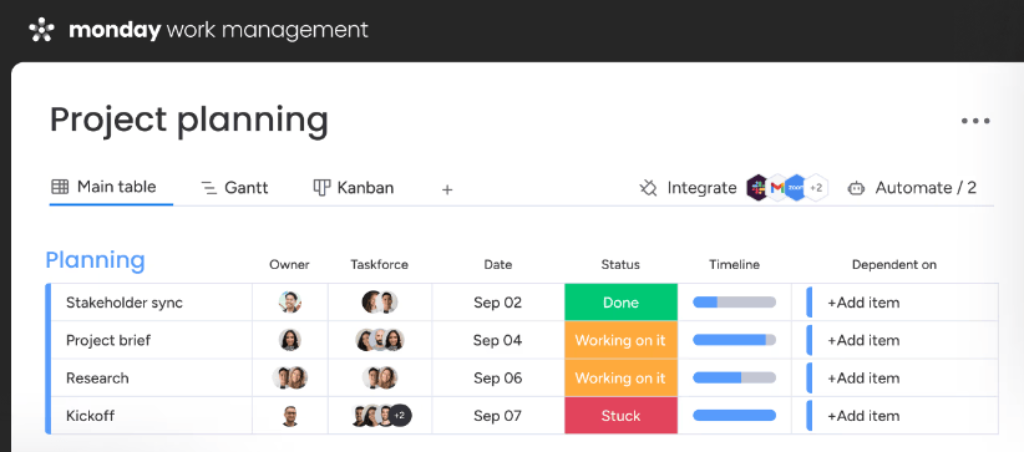
Pros:
- Highly customizable with various views and templates.
- Automation features to simplify tasks.
- User-friendly interface.
- Supports multiple project types and workflows.
- Good integration options with other tools.
Cons:
- expensive for smaller teams.
- Some users may find it overwhelming due to its features.
- Steeper learning curve for advanced functionalities.
- Slow down Performance with large data sets.
- The basic plan has limited features.
Pricing: Monday.com provides a free trial. Paid plans start at $8/user/month for the Basic plan, with Standard at $10/user/month, Pro at $16/user/month, and Enterprise plans with custom pricing.
4. Jira
Jira, by Atlassian, is tailored for software development teams and supports agile methodologies like Scrum and Kanban.
It offers robust issue tracking, sprint planning, and reporting features, making it ideal for managing complex projects.
Pros:
- Excellent for agile and software development teams.
- Powerful issue and bug tracking.
- Customizable workflows and boards.
- Advanced reporting and analytics features.
- Strong integration with development tools.
Cons:
- Complex for non-technical users.
- Expensive for larger teams.
- cluttered interface .
- Overkill for non-software projects.
Pricing: Jira has a free plan for up to 10 users. Paid plans start at $7.75/user/month for Standard, $15.25/user/month for Premium, and custom pricing for Enterprise solutions.
5. ClickUp
ClickUp is an all-in-one project management tool that offers task management, time tracking, and Gantt charts.
Its flexibility and extensive feature set make it suitable for teams seeking a comprehensive solution for project and productivity management.
Pros:
- Comprehensive feature,
- Customizable tasks, views, and workflows.
- Built-in time tracking and productivity tools.
- high degree of flexibility.
- Good integration options.
Cons:
- Can be overwhelming due to its extensive features.
- Cluttere interface.
- Learning curve for new users.
- Limited offline access.
- The free plan has restrictions.
Pricing: ClickUp offers a free plan with basic features. Paid plans include Unlimited ($5/user/month), Business ($12/user/month), and Enterprise with custom pricing.
6. Wrike
Wrike is designed for advanced project management with features such as customizable workflows, real-time collaboration, and detailed reporting.
It caters well to teams that require in-depth project tracking and management.
Pros:
- Advanced custom workflows.
- Real-time collaboration and document sharing.
- Detailed reporting and analytics.
- Flexible with various project types.
- Good integration options.
Cons:
- complex and hard to navigate initially.
- Higher cost for small teams.
- Limited features in the free plan.
- Performance can slow with large projects.
Pricing: Wrike offers a free plan with limited features. Paid plans start at $9.80/user/month for Professional, $24.80/user/month for Business, and Enterprise plans with custom pricing.
7. Basecamp
Basecamp is known for its simplicity and focus on team communication.
It combines project management with features like message boards, to-do lists, and file storage, making it a good choice for smaller teams looking for an easy-to-use tool.
Pros:
- Simple and user-friendly interface.
- Combines project management with team communication.
- Flat rate pricing for unlimited users.
- Good for smaller to medium-sized teams.
- Easy to set up and get started.
Cons:
- Limited advanced project management features.
- Less customizable compared to other tools.
- No built-in time tracking.
- Can lack detail for larger projects.
- Limited reporting options.
Pricing: Basecamp has a flat rate pricing model of $99/month for unlimited users and projects, with a free plan for personal use.
8. Smartsheet
Smartsheet combines spreadsheet functionality with project management features, making it ideal for teams that prefer a structured approach.
It offers Gantt charts, task lists, and automation to manage projects effectively.
Pros:
- Easy data management.
- Includes Gantt charts and automation features.
- Suitable for various project types.
- Good for structured project management.
- Comprehensive reporting and analytics.
Cons:
- Can be pricey for smaller teams.
- The steeper learning curve for users unfamiliar with spreadsheets.
- The interface may be overwhelming for new users.
- Limited offline access.
- The basic plan has fewer features.
Pricing: Smartsheet offers a free trial. Paid plans start at $7/user/month for Individuals, $25/user/month for Businesses, and Enterprise plans with custom pricing.
9. Microsoft Project
Microsoft Project is a powerful tool for managing complex projects, with features such as Gantt charts, resource management, and advanced reporting.
It is suitable for large organizations and projects requiring detailed planning.
Pros:
- Advanced project management and scheduling tools.
- Comprehensive resource management.
- Detailed reporting and analytics.
- Integration with Microsoft Office Suite.
- Good for complex, enterprise-level projects.
Cons:
- Complex and may have a steep learning curve.
- Expensive compared to other tools.
- Not as user-friendly for beginners.
- Limited integration with non-Microsoft products.
- Can be overkill for simple projects.
Pricing: Microsoft Project has various pricing options, including Project Plan 1 at $10/user/month, Project Plan 3 at $30/user/month, and Project Plan 5 at $55/user/month.
10. Notion
Notion is a versatile tool that combines project management with note-taking and document collaboration.
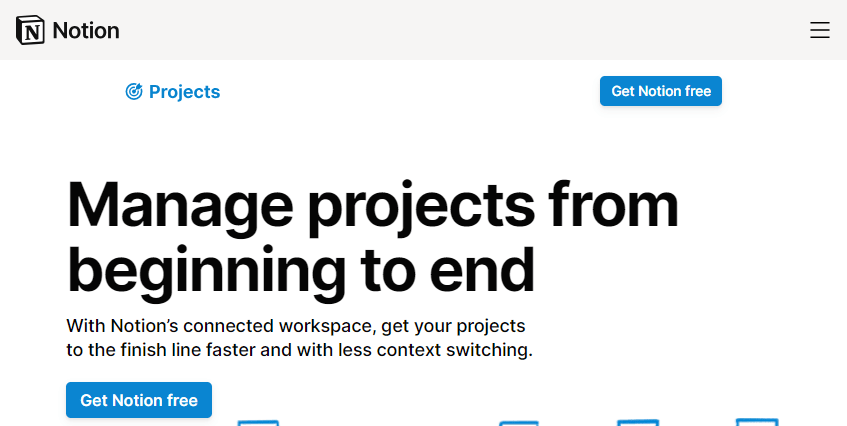
Its customizable databases and its boards make it suitable for teams that need flexibility in managing projects and information.
Pros:
- Highly customizable for different use cases.
- Combines project management.
- User-friendly interface.
- Versatile for both personal and team use.
- Good integration options.
Cons:
- Limited advanced project management features.
- Require time to set up and customize.
- Less effective for large, complex projects.
- Some features are only available in paid plans.
- Limited offline functionality.
Pricing: Notion offers a free plan for personal use. Paid plans include Personal Pro at $4/month, Team at $8/user/month, and Enterprise with custom pricing.
This breakdown provides a comprehensive overview of each software’s strengths, weaknesses, and pricing, helping you choose the best tool for your project management needs.
Our Opinion:
Pick the Suitable Software
I hope things are clear by now. I’ve shared my opinion on all 10 project management tools. Let’s begin:
No Doubt, The top 10 project management tools, including Asana, Trello, and Monday.com, offer a range of features designed to meet various needs.
Asana excels in task management and workflow organization, making it suitable for teams of all sizes. Trello provides a simple, visual approach with its card-based system, ideal for straightforward project tracking. Monday.com stands out with its highly customizable workflows and multiple project views, perfect for teams seeking flexibility.
Jira is favored by software development teams for its Agile boards and issue-tracking capabilities. ClickUp offers a comprehensive all-in-one solution with task management and time tracking. Wrike’s advanced features support complex project management, while Basecamp delivers a user-friendly interface for small to medium-sized teams.
Smartsheet combines the familiarity of spreadsheets with powerful project management tools. Microsoft Project is tailored for managing large, complex projects with its advanced scheduling and reporting features.
Finally, Notion provides a versatile platform for both project management and note-taking, catering to a wide range of uses.
Each tool offers unique strengths, and understanding their features can help you choose the best fit for your project’s needs.
Remember, the right tool can make all the difference in how smoothly your projects run.
FAQs: Best Project Management 2024
What is project management software used for?
Project management software helps teams plan, organize, track, and manage projects. It allows users to assign tasks, set deadlines, track progress, and collaborate effectively.
How do I choose the right project management software for my team?
Consider factors such as the size of your team, the complexity of your projects, the specific features you need, and your budget. Many tools offer free trials, so you can test them out before purchasing.
Can I use project management software on mobile devices?
Most project management software offers mobile apps or responsive web interfaces, allowing you to manage projects and stay updated from your smartphone or tablet.
How does Microsoft Project handle complex projects?
Yes, Microsoft Project is designed for complex projects with extensive planning and resource management needs.
Is Smartsheet suitable for all team sizes?
Smartsheet works well for teams of all sizes but may be costly for smaller teams. It’s especially useful for larger teams and complex projects due to its robust features and advanced project management tools. However, smaller teams might find it more than they need, depending on the complexity of their projects.
Can Jira handle non-software projects?
Jira is best suited for software and IT projects. For other types of projects, other tools may be better.
What makes Monday.com unique?
Monday.com offers customizable workflows and multiple views, including Kanban and Gantt charts.
Can I use Asana offline?
Asana has limited offline functionality. It works best with an internet connection. You can access certain tasks you’ve recently viewed on the mobile app, but for full functionality, including updates and new tasks, you’ll need an internet connection.
Wrap-Up
Conclusion: Project Management Software
Picking the right project management software can greatly impact your team’s productivity and project outcomes. The 10 tools we’ve reviewed each offer distinct advantages and are designed to meet different requirements and preferences.
All three offer easy-to-use interfaces and are perfect for teams looking for simplicity and efficiency. They help you stay organized without overwhelming you with too many features.
Monday.com and ClickUp are great if you need lots of customization and features for more complex projects. Jira and Smartsheet offer advanced tools for detailed project tracking and reporting, making them perfect for larger teams.
For strong integrations and agile support, Wrike and Microsoft Project are solid options. Last but not least, Notion is a flexible tool that combines project management with note-taking and document sharing.
To find the right tool for your team, think about what features you need, how complex your projects are, and your budget. Many of these tools offer free trials, so you can try them out and see which one fits your team best.

